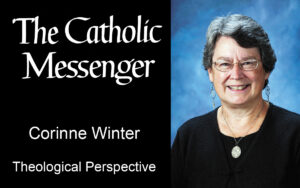By Corinne Winter
The newspapers these days are filled with accounts of urgent national and international political challenges. There are the issues of Korean and Iranian weapons programs, the international accord on climate change, immigration, international travel, DACA, health care, taxes, education funding and so many more. The issues are complex and often emotionally charged. It is very easy to become overwhelmed or to back away because we lack some of the kinds of expertise that must be brought to bear.
 Not long ago, I heard an interview in which a reporter challenged a politician to explain why, even though the politician considers himself a good Catholic, his position on the issue of immigration differs from that of Catholic bishops. The politician asserted that as immigration is not a matter of doctrine, (he failed to include morals as an area of magisterial authority), the bishops’ opinion held no more weight than anyone else’s. He went on to suggest that Catholic bishops are likely biased because many undocumented immigrants are Catholic. But his main point was that the church should probably stay out of political matters.
Not long ago, I heard an interview in which a reporter challenged a politician to explain why, even though the politician considers himself a good Catholic, his position on the issue of immigration differs from that of Catholic bishops. The politician asserted that as immigration is not a matter of doctrine, (he failed to include morals as an area of magisterial authority), the bishops’ opinion held no more weight than anyone else’s. He went on to suggest that Catholic bishops are likely biased because many undocumented immigrants are Catholic. But his main point was that the church should probably stay out of political matters.
It is true that regarding details of legal, economic and political processes, faith and doctrine do not provide all of the answers. But the church has a solid tradition of Social Catholic Teaching grounded in convictions about humanity that are matters of doctrine, and in the belief that doctrines have implications for the way we ought to live. Pope Benedict, for one, described the church as an “expert in humanity” and thus as obligated to speak out on matters affecting the ability of all people to live fully.
The equal dignity of all persons as created by God and in the divine image is a matter of doctrine, and it has practical implications. The same is true of the obligation to exercise a “preferential option for the poor,” a bias in favor of benefiting those who are not favored by current social, political and economic structures. Thus, while my Catholic faith doesn’t bind me to a certain political party or to the details of a certain bill, it does obligate me to uphold certain principles and to pose certain questions with regard to any issue.
Does a proposed law of the system demonstrate active respect for human life at every stage? Does it attend to the good of creation? Does it recognize the right of all persons to benefit from the goods of the earth and to have access to basic necessities, and does it give that priority even over a legitimate right to private property? Does it provide for all persons the opportunity to contribute to society and to participate in decisions affecting their lives? Does it uphold the dignity of work and the right of laborers to take pride in and to reap just benefits from their labor? Is it consistent with the requirement that acts of war must be justified and must be carried out according to principles of justice including the protection of innocent life?
Catholic leaders including Pope Francis and his predecessors, many Catholic organizations dedicated to justice, the U.S. Conference of Catholic Bishops, Iowa Catholic bishops and many individuals continually remind us of our calling to remain concerned about the world in which we live and to work for its transformation. While we do not have or claim to have all the answers, we need to keep asking the critical questions and helping where we are able in the search for the answers.
(Corinne Winter is a professor-emeritus of St. Ambrose University, Davenport)











